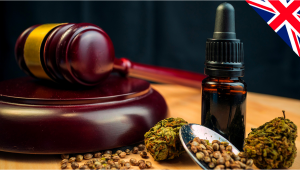UK Government Proposal Would Effectively Decriminalize Cannabis

Titled Swift, Certain, Tough: New Consequences for Drug Possession, the recent white paper by the UK government paradoxically suggests a more lenient approach to handling personal possession of cannabis and other drugs. The proclaimed goal is still the eradication of use, but the authorities hope to achieve it by diverting offenders to drug rehabilitation and awareness programs instead of processing them through the criminal system.
Critics aren’t enthusiastic about the outdated views espoused by the authors but consider it an improvement on the former war-on-drugs rhetoric. They welcome the general direction that the UK government wants to take – meaning that drug use will be treated as a health issue and not the responsibility of law enforcement.
Three-Tier System for Low-Level Offenses
The white paper was published to start public discussions, but depending on the feedback, the measures can be adopted and change the rules of how the police treat low-level drug offenders.
So, in the future, if you get caught with a small personal quantity of an illicit substance, you will face the following consequences, depending on whether it’s your first offense or not:
Tier 1. You're only a first-time offender, so you’ll go to a drug awareness course which you'll have to pay out of your pocket. The alternative is to ignore this questionable piece of education, but this decision will cost you even more as you’ll have to pay a hefty fine.
Tier 2. A second offense incurs a more intensive (and costly?) drug awareness course plus a period of mandatory drug testing. Not interested? Then face charges for the first of your offenses and appear before a judge this time.
Tier 3. The third time’s the charm as with the third offense, you’ll receive an exclusion order preventing you from going to certain areas or events, such as nightclubs, and say goodbye to your passport and driver’s license for a set period. You’ll also have to attend yet another drug awareness course.
Please be aware that all this is still in the making, and in the meantime, you’ll go through a criminal court system in an old-fashioned way.

The Tougher Policy Failure Acknowledged
It’s unclear whether the proposed model can be made to work. Especially questionable are the third-tier measures, such as exclusion orders and the confiscation of documents. Leaving users alone is hardly the government’s plan as the authors of the white paper propose to appoint even more funds to the police for on-the-spot drug testing. They also declare their wish to identify more drug users and send them to treatment.
However, treatment is still better than criminal prosecution. According to Release UK, a group of drug reform advocates, over half a million people in the country are subjected to stop and frisk by the police every year. Besides, people of color and ethnic minorities are 4.1 times more likely to be searched than Whites. Although the diversion to paid drug awareness courses is likely to only benefit middle-class youth who have money and still be a burden for the poor and underprivileged, at least they won’t have a criminal record.
By trying new approaches to drug use, the authorities clearly admit that the former prohibitionist policy has been a failure that has done nothing to curb consumption or address related issues of high crime rates and the rise of organized crime.











Comments